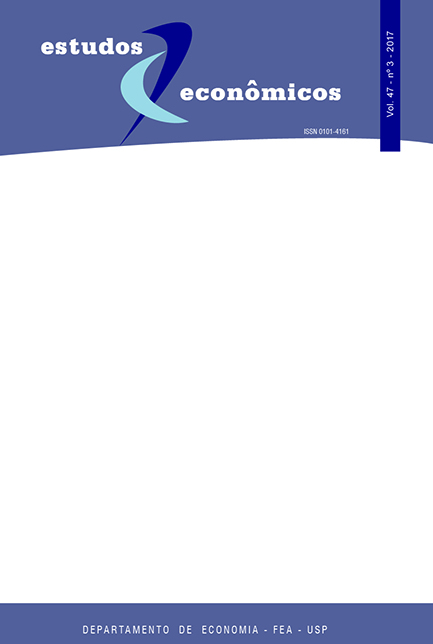Inflation Expectations in a Limited Rationality Environment: a discrete choice approach
DOI:
https://doi.org/10.1590/0101-41614731hajKeywords:
Heterogeneous inflation expectations, Dispersion in cognitive abilities, Agent-based computational modelsAbstract
We propose a discrete (ternary) choice model to study the frequency distribution of inflation predictors. In every reappraisal period of the foresight strategies, each agent chooses only one among three predictors (naive, adaptive and VAR) to forecast the monthly inflation rate. The
predictor selection process is modeled as a discrete choice dynamics based on two attributes, namely, accuracy less the average cost predictor (private attributes) and dispersion in cognitive abilities. The calibrated agent-based computational model shows that heterogeneity in inflation expectations is persistent, that is, less accurate predictors coexist with the most accurate
predictor due to the dispersion in cognitive abilities of agents.
Downloads
References
Adam, Klaus. 2007. “Experimental evidence on the persistence of output and inflation.” Economic Journal 117
(520): 603-636. doi:10.1111/j.1468-0297.2007.02043.x.
Amilon, Henrik. 2008. “Estimation of an adaptive stock market model with heterogeneous agents.” Journal of
Empirical Finance 15 (2): 342-362. doi:10.1016/j.jempfin.2006.06.007.
Assenza, Tiziana, et al. 2013. “Individual expectations and aggregate macro behavior.” Tinbergen Institute
Discussion Paper 13-016/II.
Blanchflower, David G., and Conall Maccoille. 2009. “The formation of inflation expectations: an empirical
analysis for the UK.” NBER Working Paper 15388.
Branch, William A. 2002. “Local convergence properties of a cobweb model with rationally heterogeneous
expectations.” Journal of Economic Dynamics and Control 27 (1): 63-85.
Branch, William A. 2004. “The theory of rationally heterogeneous expectations: evidence from survey data on
inflation expectations.” Economic Journal 114 (497): 592-621.
Brock, William A., and Cars H. Hommes. 1997. “A rational route to randomness.” Econometrica 65: 1059-1160.
Bryan, Michael F., and Guhan Venkatu. 2001. “The demographics of inflation opinion surveys.” Federal Reserve
Bank of Cleveland Issue Oct.
Chavas, Jean-Paul. 2000. “On information and market dynamics: the case of the US beef market.” Journal of Economic Dynamics and Control 24 (5): 833-853. doi:10.1016/S0165-1889(99)00027-5.
Coibion, Olivier, and Yuri Gorodnichenko. 2012. “What can survey forecasts tell us about informational rigidities?” Journal of Political Economy 120 (1): 116-159.
Coibion, Olivier, and Yuri Gorodnichenko. 2015. “Information rigidity and the expectations formation process: a simple framework and new facts.” American Economic Review 105 (8): 2644-2678.
Conlisk, John. 1996. “Why bounded rationality?” Journal of Economic Literature XXXIV: 669-700.
DeJong, David N., and Chetan Dave. 2011. Structural macroeconometrics. Princeton: Princeton University Press.
Freitas, Gustavo Gomes de. 2003. “Economia e sistemas complexos: interações sociais, dinâmicas emergentes e uma análise da difusão da internet na cidade de São Paulo.” Dissertação de Mestrado, Universidade de São Paulo.
Hommes, Cars H. 2011. “The heterogeneous expectations hypothesis: some evidence from the lab.” Journal of Economic Dynamics and Control 35: 1-24. doi:10.1016/j.jedc.2010.10.003.
Lima, Gilberto Tadeu, Mark Setterfield and Jaylson Jair da Silveira. 2014. “Inflation targeting and macroeconomic stability with heterogeneous inflation expectations.” Journal of Post Keynesian Economics 37 (2): 255-279.
Lima, Gilberto Tadeu, and Jaylson Jair da Silveira. 2015. “Monetary neutrality under evolutionary dominance of bounded rationality.” Economic Inquiry 53 (2): 1108-1131. doi:10.1111/ecin.12195.
Maital, Shlomo, and Sharome Maital. 1981. “Individual-rational and group-rational inflation expectation: theory
and cross section evidence.” Journal of Economic Behavior and Organization 2 (2): 179-186.
Mankiw, N. Gregory, Ricardo Reis and Justin Wolfers. 2004. “Disagreement about inflation expectations.” NBER
Macroeconomics Annual 2003 18: 209-270.
Pfajfar, Damjan, and Emiliano Santoro. 2009. “Asymmetries in inflation expectations across socioeconomic groups.” Mimeo, University of Copenhagen.
Pfajfar, Damjan, and Blaz Zakelj. 2011. “Inflation expectations and monetary policy design: evidence from the laboratory.” Mimeo, Tilburg University.
Silveira, Jaylson Jair da, and Gilberto Tadeu Lima. 2013. “Regime monetário de meta de inflação em um ambiente de heterogeneidade de estratégias de formação de expectativas de inflação.” Estudos Econômicos 43 (2): 213-239.
Silveira, Jaylson Jair da, and Gilberto Tadeu Lima. 2015. “Conquering credibility for monetary policy under sticky confidence.” Revista Brasileira de Economia 69 (2): 251-261.
Sargent, Thomas J. 1993. “Bounded rationality in macroeconomics.” Oxford: Oxford University Press.
Sims, Christopher A. 2003. “Implications of rational inattention.” Journal of Monetary Economics 50 (3): 665-690.
Sims, Christopher A. 2010. “Heterogeneity, learning and inflation stickiness in inflation expectations.” Journal of Economic
Behavior and Organization 75 (3): 426-444.
Souleles, Nicholas S. 2001. “Consumer sentiment: its rationality and usefulness in forecasting expenditure-evidence from the Michigan micro data.” NBER Technical Report. http://www.nber.org/papers/w8410.pdf.
Thehan, Bharat. 2010. “Survey measures of expected inflation learning and the inflation process.” Working Paper 2009-10. Federal Reserve Bank of San Francisco. http://www.frbsf.org/publications/economics/papers/2009/wp09-10bk.pdf.
Train, Kenneth. 2003. Discrete choice models with simulation. Cambridge: Cambridge University Press.
Weber, Anke. 2010. “Heterogeneous expectations, learning and European inflation dynamics.” Discussion Paper Series 1: Economic Studies No 16/2007. Deutsche
Downloads
Published
Issue
Section
License
Copyright (c) 2017 Helberte João França Almeida, Jaylson Jair da Silveira

This work is licensed under a Creative Commons Attribution-NonCommercial 4.0 International License.
By submitting an article, the author authorizes its publication and attests that it has not been submitted to any other journal. The original article is considered final. Articles selected for publication are proofread for grammatical and orthographic errors. The journal does not pay rights for published articles. The Institute of Economic Research from the School of Economics, Business and Accounting of the University of São Paulo (Instituto de Pesquisas Econômicas da Faculdade de Economia, Administração e Contabilidade da Universidade de São Paulo) owns the journal's copyright.




